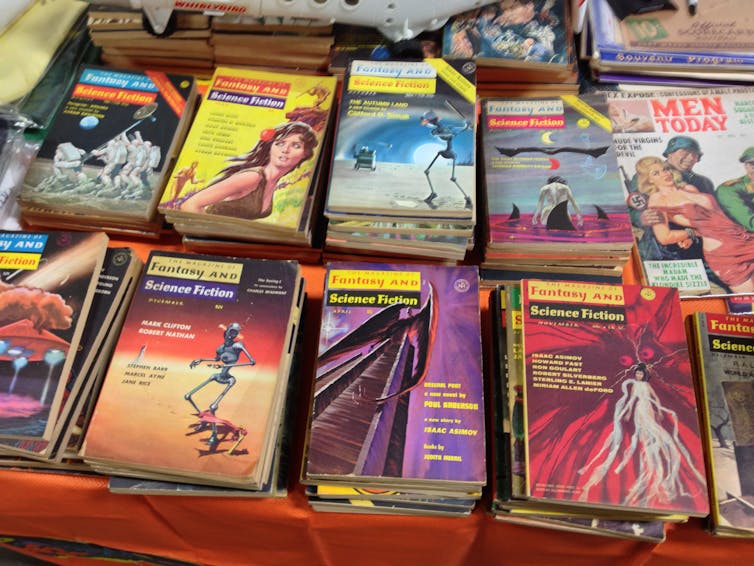Bob Dylan’s Nobel prize win and the ensuing debate as to whether a musician should have been considered is a striking comment on the seemingly glib question of what literature actually is. And with the Man Booker prize also just around the corner, how and why literature matters are topics currently animating plenty of cultural debate.
Assessing the literary merit of Dylan’s work is nothing new. Christopher Ricks, a former Professor of Poetry at the University of Oxford, published a book on Dylan back in 2003, and a Cambridge Companion to Bob Dylan was released a few years later. But others have argued that his Nobel award snubs those who write “literature” — as in, in books.
The Nobel Prize in Literature is awarded to a writer who has produced for the field of literature, in Alfred Nobel’s words, “the most outstanding work in an ideal direction”. Dylan won the prize for having “created new poetic expressions”. The UK’s former Poet Laureate Andrew Motion commented that Dylan’s songs are “often the best words in the best order”. And Professor Sara Danius, Permanent Secretary of the Swedish Academy, spoke of Dylan’s “pictorial thinking”. The week before Dylan’s win, David Szalay’s All That Man Is, shortlisted for the Man Booker, won the Gordon Burn prize. The judges said the novel “subtly changes the way you look at the contemporary world”.
But what is an “ideal direction” for literature? And how exactly does literature change our relationship with “the contemporary world”?
Changing minds
The idea that reading influences us is something we hear throughout our lives. Children are encouraged to read for more reasons than developing literacy, and huge claims are made for the power of literature at all stages from childhood to old age. Many have spoken of how literature engages the imagination; others emphasise its empathetic and political values.
It’s not just writers and scholars who stress literature’s importance. The Guardian recently published an article about a charity that publishes books especially for children with dyslexia. The newspaper began by wondering how children could be enticed to read, citing evidence that reading improves academic ability and happiness.
Some people are sceptical about such powerful claims for literature. Philosophy professor Gregory Currie has argued against fiction’s power to “change our minds”. While I disagree with Currie about whether or not literature can have a significant impact on its readers, he’s right about how difficult it is to assess the claim.
Figuring out what counts as “literary” is famously difficult. There aren’t strict criteria for literary prizes – there couldn’t be, as there is no prescription for writing well. But Dylan’s prize highlights an important fact: what counts as literature emerges from use of language. Genre – whether you’re talking about realism, science fiction, or folk song – doesn’t have much to do with it.

This isn’t always acknowledged within academia. For example, experiments concerning literature tend to focus primarily on whether or not a book is fiction when accounting for its impact. But while the fictional world is important, the way that world has been created is more so. Rather than generic distinctions or the status of a book as fiction or non-fiction, it is literary language – “the best words in the best order” – that makes a book matter to us.
Linguistic risks
We’re now just a few days away from finding out the winner of the Man Booker Prize. Announcing the shortlist, the judges spoke of their excitement around “the willingness of so many authors to take risks with language and form”.
Their emphasis on language and form seems right. If Dylan’s prize win shows anything, it’s that words have a unique ability to deepen engagement with human emotion and experience, whether they come in songs, plays, poems or prose. It is the way words are used that makes “literature”.
We care hugely about literature. When David Comer Kidd and Emanuele Castano published a study in 2013 proposing that fiction has a positive impact on our ability to empathise, the news made the national press. They suggested that “fiction may change how, not just what, people think about others”. In fact, it’s likely that literature in general – literary prose, poetry, and songs whose lyrics are as generative of meaning as Dylan’s – only changes “how” we think, shaping our concepts and ways of perception more than it influences thoughts directly. It might not change “what” we think at all.
This is because the way a book is written is what creates the experience for readers. Take Ian McEwan’s On Chesil Beach, currently being adapted for the screen. Tell someone it’s about a failure to have sex on a wedding night, and they’re unlikely to take it seriously or meaningfully. But get them to read it, and they’ll find its tone one of “almost reverent care”.
It’s the form of a book or a song that prompts the way we engage with it – whether it enables “deep reading” or merely “light” – not its genre, or its status as fiction. As Dylan’s prize shows, it’s the power of language that has an impact on readers and listeners. What really matters are words.

